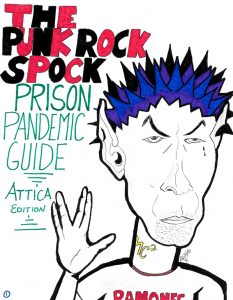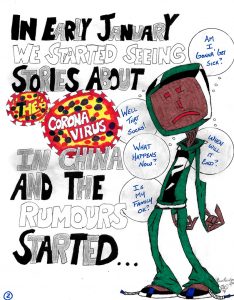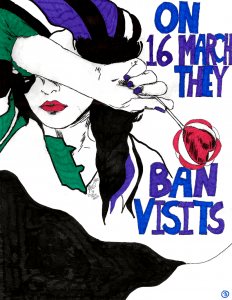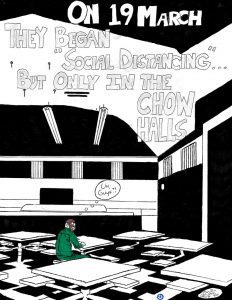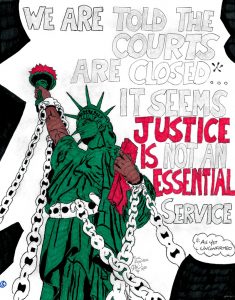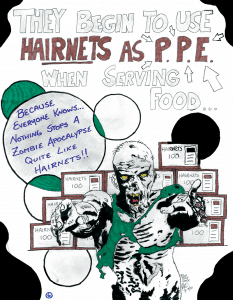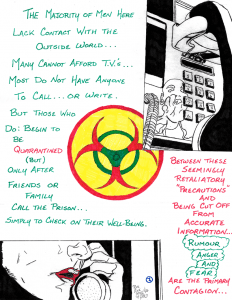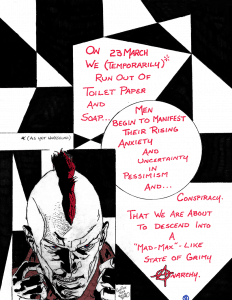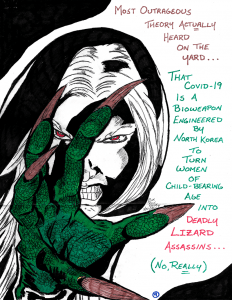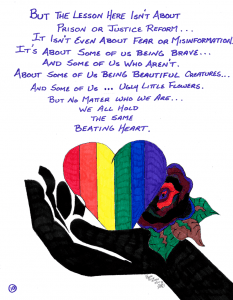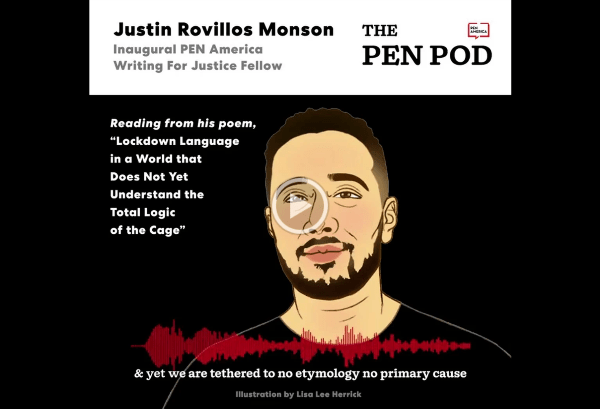Temperature Check, Vol. Three Feat. Jeremy Wilson and Lawrence Bartley

A new rapid response series from PEN America’s Prison and Justice Writing Program, featuring original creative reportage by incarcerated writers, accompanied by podcast interviews with criminal justice reform experts on the pandemic’s impact in United States’ prisons.
To receive this series straight to your inbox, sign up here.
Volume 3.0 Table of Contents
- Introduction to Temperature Check
- Dispatches from Inside: Graphic Narrative by “PunkRockSpock”
- Podcast: The Marshall Project’s Lawrence Bartley
- Featured Work From the PEN America Prison & Justice Community
- Advocacy, Action and Resource Round-Up
Introduction
Dear Readers,
As the crisis rages on, all signs point to too little, too late in the carceral system—and evidence suggests some officials are not being forthright or truthful about the extent of their decarceration efforts.
Potential human rights violations run amok as ad-hoc efforts are employed to keep the justice system semi-operational. By moving deliberations to video, judges are finding the public—and those who monitor court activity—increasingly left out of digital court rooms.
And some business-as-usual approaches have massive mental and physical health implications for those stuck inside. As of April 10th, several federal prison factories were still in operation, putting workers at repeated risk of infection. On the other end of the spectrum, with questionable outcomes for containing the virus, many prisons move to lockdown, confining incarcerated people to a 6×8 foot cell for 23 hours a day.
Horrifyingly, detainees at Rikers Island are being offered $6 an hour—a “large” income in carceral terms—to dig mass graves on Hart Island.
On the streets, questions arise about state surveillance of COVID-19 diagnosed people who refuse to quarantine, and concerns are raised that enforcement of quarantine orders will disproportionately affect low income Black and Brown people—populations already targeted by the justice system.
In the face of overwhelming and relentless terrible news, this week’s Temperature Check takes a slightly different approach to information-sharing, balancing the straight-ahead reportage with more personal, emotional offerings. These two important and informative perspectives deliver insight on the pandemic through highly engaging, and even colorful, means.
First, artist “PunkRockSpock” AKA Jeremy Wilson offers a graphic narrative Prison Pandemic Guide—a captivating and visually-alive inside look into Attica prison’s response to COVID-19, accompanied by an active creative prompt for you to try.
Then, listen to an absorbing half-hour podcast conversation with Lawrence Bartley, Director of News Inside for The Marshall Project, who offers a multitude of insights from both his 27 years incarcerated, and his career in journalism, into the experience of obtaining accurate news in prison, as well as his own attempts to make fact-based news more accessible and transparent.
With thanks for your attention, interest and advocacy.
In solidarity,
Caits Meissner
The PEN America Prison and Justice Writing Team
Caits Meissner, Program Director
Robert Pollock, Program Manager
Kate Cammell, Spring 2020 Program Intern
Elizabeth Fiore, Spring 2020 Program Intern
Claire Adler, Copy Editor
Dispatches from Inside
For Temperature Check, we’re commissioning currently incarcerated writers to share the direct impact of COVID-19 in prison through creative reportage.
Our third dispatch, a graphic narrative prison pandemic guide comes from “PunkRockSpock,” the pseudonym of the artist/writer/nerd currently incarcerated in New York under the alias “Jeremy Wilson”.
He is a cisgender male hatched out of an egg (genetically engineered by evil scientists) in Nova Scotia. He likely owes you an apology. His work has been preferred reading in the dirty bathrooms of grimy punk clubs across North America for decades. He’d really enjoy receiving your plans for global domination.
Scroll to the end to find an original prompt from the artist, offering an entry point into your own creative practice during this challenging time.
The PunkRockSpock Prison Pandemic Guide:
Attica Edition By PunkRockSpock AKA Jeremy Wilson
*Click any image to view the series full-size. Or click here.
*A Prison Pandemic Handbook Post-Script from PunkRockSpock:
I don’t have a TV yet, but someone I’m friendly with does a few cells down. We’ve worked out a system by which he watches the news for me and “transcribes” what transpires. It’s the best option I have available to stay somewhat informed day-to-day. Recently, a reporter asked Governor Cuomo a question about the Department of Corrections and Community Supervision’s (DOCCS) ability to quarantine inmates who test positive and are symptomatic.
Cuomo’s answer was (as it was relayed to me) that each facility had medical isolation cells that are equipped with “negative air flow,” and that he wasn’t concerned about DOCCS ability to cope. Though what Cuomo said is technically true, it infers that DOCCS is equipped to handle an outbreak.
It isn’t.
I worked as an Infirmary Porter/Orderly at Sullivan Correctional Facility. Sullivan’s infirmary was used by three other facilities in the area. There were only five medical isolation cells in the infirmary. FIVE. And though they were equipped with “negative airflow,” they were also used for post-op surgical isolation (infection control), suicide watch, and for people on investigative “shit” watch. Overflow would be sent to the SHU (solitary) or RMHU (mental health) cells, which are not equipped with the capability for medical isolation. Five cells for four facilities, without the proper level of quarantine.
Here at Attica, I was told (but can’t confirm), there are 6 cells without the appropriate level of quarantine. They have taken a single “company” on A-Block, and turned it into a “Quarantine Unit.” But the cells are the same as every other blocks: open-faced, ventilation connected. If there was an outbreak, consider: if a facility has just 1000 prisoners, and only half became infected, but just 20% required hospitalization… that’s 100 people—and only 5 to 10 cells to accommodate them. (Though in reality, in that equation, they’d need 500 cells, as 500 would need to be isolated to prevent “super” spread.)
And if they had to transfer prisoners to outside hospitals… well, they just don’t have the custody staff to do that. In the meantime, officers have stopped wearing face masks…
Thus: Yes, DOCCS may miss the storm this go round… but what about next time?
Craft Your Own Rapid Response
Try this creative prompt from PunkRockSpock:
In these exceptionally bizarre times, many of us find ourselves living as if we were under siege by sneezing ninjas decked out in surgical masks. With all of this uncertainty & forced isolation, it would be very easy to get lost dwelling on THIS moment. Instead, I challenge you to find parts of yourself you may have forgotten.
- Tear a single sheet of paper into 8 pieces
- On each individual piece write one of the following:
Happy, Afraid, Sexy, Sad, Strange, Angry, Alone, Healthy - Fold them each in half & place them into a hat, bowl or bathtub
- Close your eyes & select one
- After reading it, think of the point in your life that you felt that particular emotion the most intensely/purely… the SINGLE moment you felt either the angriest, the happiest, the sexiest, etc…
- What were you listening to then? What song, what album, what artist, what genre? Find it… now create a playlist of 10 songs inspired by that theme.
- Take a pad of paper, writing utensil (pen, pencil, marker, quill, lipstick), along w/ your preferred means of listening to that playlist & in an act of simple solidarity w/ the men & women that PEN fights for… go into your bathroom or closet… shut the door…
- Press “play”, “shuffle” & “repeat”…close your eyes… think of that moment… replay it… relive it… feel that emotion again… be sad, be angry, be sexy… open your eyes…
- Now… as the music plays… write. Poem, prose, play… it doesn’t matter… just write… put it all on the page…till the music stops.
Respond to PunkRockSpock’s work via JPay or “snail mail” at Jeremy Wilson, DIN# 17A2153, Attica CF, Box 149, Attica, NY 14011-0149.
Works of Justice Podcast Interview: Lawrence Bartley from the Marshall Project
 Inside the information deserts of prison and jails, incarcerated people are often unable to locate facts-based news about both the outside world, and the changing conditions of their own lives.
Inside the information deserts of prison and jails, incarcerated people are often unable to locate facts-based news about both the outside world, and the changing conditions of their own lives.
On this episode, Lawrence Bartley, Director of News Inside—a free publication that curates news related directly to incarcerated lives from The Marshall Project—helps us understand the challenge of news and incarceration, shares about his own efforts to address the information divide, and underscores the importance of continuing to tell stories during this challenging time.
Read Lawrence’s essay, “How 27 Years in Prison Prepared Me For Coronavirus,” on The Marshall Project.
Listen to the 35-minute conversation on our Works of Justice podcast:
Click here to access the transcript or listen on Apple Podcasts Spotify Google Play
Featured Work From the PEN America Prison and Justice Community on COVID-19
Listen to yesterday’s PEN Pod, PEN America’s daily pandemic-era podcast, which aired a criminal justice-focused episode featuring content from last week’s Temperature Check—a quick Q&A with Caits Meissner and poem reading by Justin Rovillos Monson—as well as an original-content interview with 2018 PEN America Writing For Justice Fellow Beth Shelburne.
Join PEN America Prison and Justice Writing Program Manager Robbie Pollock for two live readings of the creative reportage included in Temperature Check—first, on Tuesday, 4/21 through Rattlestick Playwright’s Theater, followed by Thursday, 4/23 as part of a multi-organizational series on human resilience and criminal justice reform.
Listen to Writing For Justice Fellow Arthur Longworth share about his experience in prison during the pandemic on Today Explained, a Vox Media podcast.
Advocacy, Action and Resource Round-Up
Our work with writers in prison at PEN America is almost entirely reliant on mail services. Now, the United States Postal Service could shut down in September. President Trump recently rejected a bill that would save the USPS from running out of money. With significant implications for incarcerated people at large, and our program, we invite you to sign this petition to save USPS. You can also text USPS to 50409.
The Southern Center for Human Rights has created a handbook to inform incarcerated people about COVID-19. It includes information about symptoms and transmission, measures they may be able to take to protect their health, and how to respond and advocate for themselves and others when those protections don’t exist. The entire handbook is available for you to print and mail, or share with those who have web access.
Prison Culture is calling for homemade recordings of Gwendolyn Brooks’s “To Prisoners” to be shared on social media in support of decarceration as a public health strategy for the current pandemic.
View links to our first issue’s ongoing advocacy efforts, including local movements to get soap and books into the hands of incarcerated writers here.
Further links to advocacy efforts and resources regarding COVID-19 in prisons can be found at The Justice Collaborative’s growing database.
The Marshall Project has been keeping tabs on state responses to the pandemic in prison through this easy to read tracker, and offer round ups of journalism on the pandemic through their mailing list.


